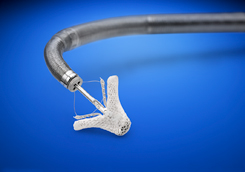
The results of the high-surgical-risk arm in the Everest II trial of Abbott’s (NYSE:ABT) MitraClip cutaneous device showed suggestion of improved clinical symptoms, left ventricular reverse remodeling and reduced mitral regurgitation at 12 months.
The high-surgical-risk arm was comprised of 78 symptomatic patients with 3+ to 4+ mitral regurgitation. Surgery was deemed too risky, with a mortality risk above 12%.
The MitraClip device is designed to slip over the mitral valve leaflets of patients without opening their chests, minimizing recovery time drastically compared to traditional open heart surgery.
Sign up to get our free newsletters delivered straight to your inbox
The guide catheter is inserted into the femoral vein to reach the heart and the procedure is performed under general anesthesia, making it ideal for patients unable to undergo surgery.
"I would say these data are very encouraging. This will be the initial group the MitraClip is used in, as they have no other alternative," lead author Dr. Patrick Whitlow told heartwire. "In Europe, where the device is already approved, it is this group of patients in whom it is predominantly being used."
Authors of an accompanying editorial said that while the MitraClip looked like a potentially good option for nonsurgical patients, its effectiveness wasn’t definitely proven in the Everest II study.
"It will be interesting to see whether these data are strong enough for U.S. approval for this high-surgical-risk group," Dr. Zoldan Turi, one of the authors of the editorial, told the news site.
The main Everest II trial, comparing the MitraClip with open heart surgery for mitral valve repair, was published last April and found the device to be significantly less effective but safer than surgery.
Of the nearly 280 patients in the study, 73 percent of those treated with open heart surgery survived the procedure, didn’t need follow-up repair of the valve and showed lower rates of mitral valve regurgitation. Only 55 percent of the MitraClip cohort met those criteria, according to the study.
But after 30 days, only 15 percent of the MitraClip subjects experience a major adverse event, versus 48 percent for the surgical interventions, and the rates of major events excluding transfusions and for transfusions requiring two units of blood or more were much lower for patients treated with the Abbott device.

